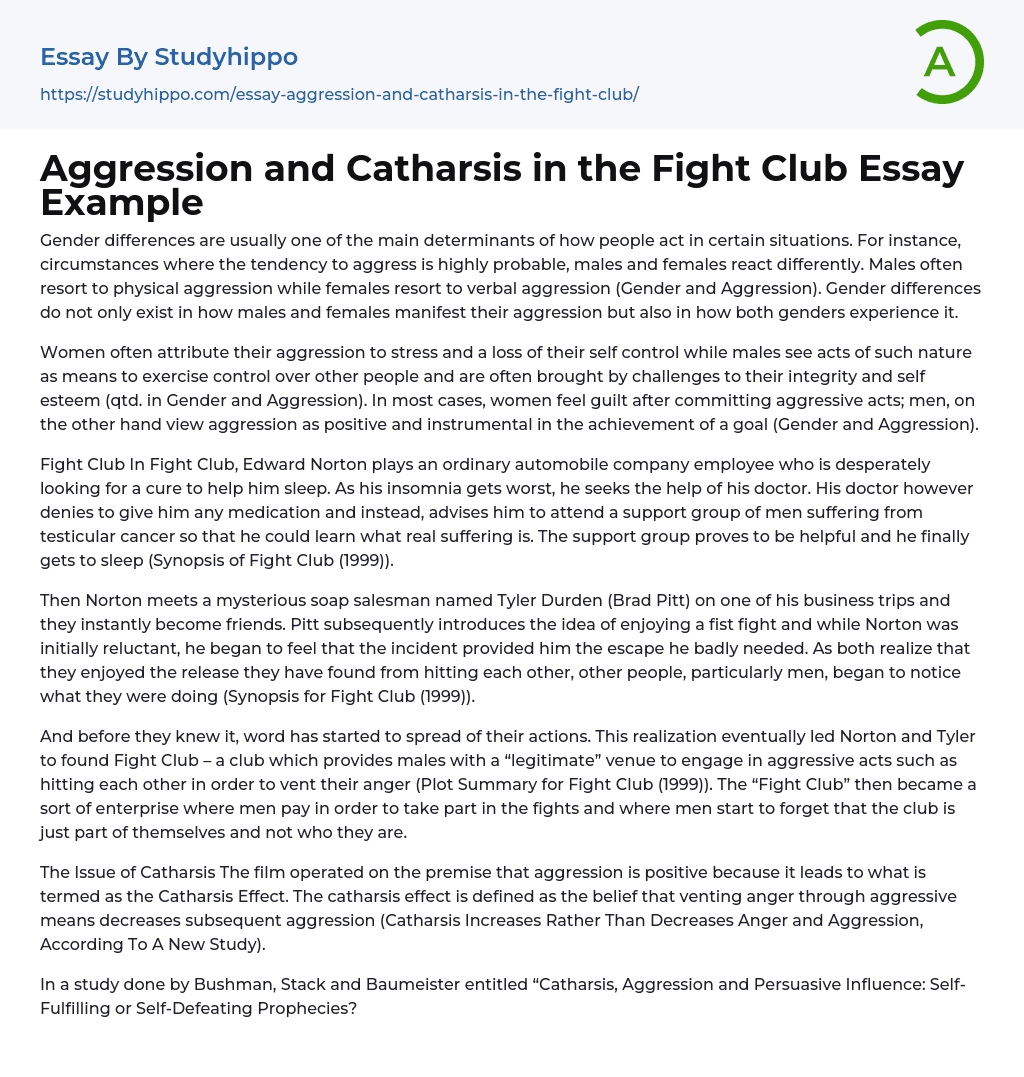Gender differences are usually one of the main determinants of how people act in certain situations. For instance, circumstances where the tendency to aggress is highly probable, males and females react differently. Males often resort to physical aggression while females resort to verbal aggression (Gender and Aggression). Gender differences do not only exist in how males and females manifest their aggression but also in how both genders experience it.
Women often attribute their aggression to stress and a loss of their self control while males see acts of such nature as means to exercise control over other people and are often brought by challenges to their integrity and self esteem (qtd. in Gender and Aggression). In most cases, women feel guilt after committing aggressive acts; men, on the other hand view aggression as positive and instr
...umental in the achievement of a goal (Gender and Aggression).
Fight Club In Fight Club, Edward Norton plays an ordinary automobile company employee who is desperately looking for a cure to help him sleep. As his insomnia gets worst, he seeks the help of his doctor. His doctor however denies to give him any medication and instead, advises him to attend a support group of men suffering from testicular cancer so that he could learn what real suffering is. The support group proves to be helpful and he finally gets to sleep (Synopsis of Fight Club (1999)).
Then Norton meets a mysterious soap salesman named Tyler Durden (Brad Pitt) on one of his business trips and they instantly become friends. Pitt subsequently introduces the idea of enjoying a fist fight and while Norton was initially reluctant, he began to feel that the incident provided
him the escape he badly needed. As both realize that they enjoyed the release they have found from hitting each other, other people, particularly men, began to notice what they were doing (Synopsis for Fight Club (1999)).
And before they knew it, word has started to spread of their actions. This realization eventually led Norton and Tyler to found Fight Club – a club which provides males with a “legitimate” venue to engage in aggressive acts such as hitting each other in order to vent their anger (Plot Summary for Fight Club (1999)). The “Fight Club” then became a sort of enterprise where men pay in order to take part in the fights and where men start to forget that the club is just part of themselves and not who they are.
The Issue of Catharsis The film operated on the premise that aggression is positive because it leads to what is termed as the Catharsis Effect. The catharsis effect is defined as the belief that venting anger through aggressive means decreases subsequent aggression (Catharsis Increases Rather Than Decreases Anger and Aggression, According To A New Study).
In a study done by Bushman, Stack and Baumeister entitled “Catharsis, Aggression and Persuasive Influence: Self-Fulfilling or Self-Defeating Prophecies? ” (qtd. n Catharsis Increases Rather Than Decreases Anger and Aggression, According To A New Study); the authors argued that catharsis increases rather than decreases aggression since the initial venting of anger could lead to more instances of aggression. The film therefore was based on a self – defeating premise. The film however addressed a very important issue: Men need to channel their aggression through some means. In our society today, norms
restrict certain behaviors such as those which are aggressive in nature and give no acceptable alternative for such.
The need to provide men with legitimate ways to deal with their anger and to educate them about their false belief regarding catharsis is of the essence. And though the first one has been done through the introduction of athletic activities, the second goal has not been fully accomplished. The need to disseminate correct information regarding acts that are aggressive in nature should be initialized as soon as possible so that harmless pranks that could lead to inconceivable repercussions such as death could be avoided.
- Social Construction of Gender essays
- Adult essays
- Aggression essays
- Altruism essays
- Archetype essays
- Behavior essays
- Certainty essays
- Conformity essays
- Deception essays
- Human Behavior essays
- Human Sexuality essays
- Maturity essays
- Morality essays
- Obedience essays
- Procrastination essays
- Reinforcement essays
- Role Model essays
- Ambition essays
- Anger essays
- Betrayal essays
- Boredom essays
- Confidence essays
- Courage essays
- Desire essays
- Disgrace essays
- Doubt essays
- Empathy essays
- Fairness essays
- Fear essays
- Feeling essays
- Forgiveness essays
- Grief essays
- Guilt essays
- Happiness essays
- Harmony essays
- Hate essays
- Honesty essays
- Honor essays
- Hope essays
- Humanity essays
- Inspiration essays
- Kindness essays
- Laughter essays
- Loneliness essays
- Lost essays
- Loyalty essays
- Need essays
- Passion essays
- Pressure essays
- Pride essays




